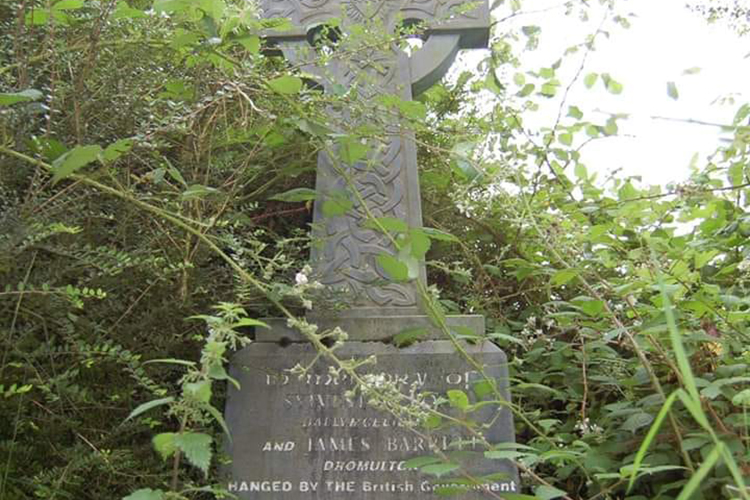Presidential pardon recommended in 1882 murder case after UCD expert review
Posted 17 April, 2024

Two men hanged more than 140 years ago for murder are to receive a posthumous presidential pardon following a case review by UCD legal expert (opens in a new window)Dr Niamh Howlin.
Sylvester Poff and James Barrett were convicted of murdering farmer Thomas Browne in October 1882, and later executed by hanging in January 1883.
Their trial took place during the Land War - an intense three-year period of agrarian agitation in rural Ireland seeking fair rent and better protections for tenant farmers; and followed the assassinations of Lord Frederick Cavendish and Thomas Henry Burke, then Ireland’s most senior civil servant.
The Phoenix Park murders as they were called, saw coercive legislation passed to clamp down on crimes such as murder, treason, arson, attacks on dwelling-houses and crimes of aggravated violence.
Mr Poff and Mr Barrett were tried twice before special juries in Cork over the murder and despite pleas for mercy they were executed.
The dying declarations of James Barrett & Sylvester Poff in Tralee Gaol on January 22, 1883, on the eve of their executions for the murder of Thomas Browne in Castleisland on October 3, 1882.
— Joe Ó Muirċeartaiġ (@muirioch) (opens in a new window)April 16, 2024
141 years later it has been recommended they receive a posthumous presidential pardon. (opens in a new window)pic.twitter.com/ZaniM61Kl0
Now some 140 years later and following a detailed review of the case by Dr Howlin, an expert in 19th Century trial law and an Associate Professor in the UCD Sutherland School of Law, the Irish Government has (opens in a new window)decided to recommend to President Michael D Higgins that he exercise his right to pardon.
This is allowed in Article 13.6 of the Constitution because the convictions were unsafe.
Minister for Justice Helen McEntee TD said “having considered the findings in Dr Howlin’s report… both men were wrongfully convicted and suffered the harshest penalty under the law of the time in what can now be attributed to a miscarriage of justice.”
Dr Howlin's case review, carried out at the request of the Department of Justice, found the convictions were unsafe based on several factors, including a ‘packed jury’, evidential deficiencies, no motive, and that other lines of enquiry were neglected during the investigation and trial.
In addition, the report found that there was no direct evidence against Mr Poff and Mr Barrett, with the case resting on the circumstantial and contradictory evidence of one witness.
“A twenty-first century criminal court would not convict [these men] on the basis of the evidence which was presented by the Crown in 1882,” she said.
“The convictions were also inconsistent with the legal standards of the period. They were convicted based on evidence which was both circumstantial and weak.
“The trials and conviction of Mr Poff and Mr Barrett included legal and procedural deficiencies which were ‘so inconsistent with the legal standards of the period and so objectively unsatisfactory and unfair, that they render the conviction unsafe.”
Descendants of cousins Sylvester Poff & James Barrett who were wrongfully convicted & hanged for the murder of a local landlord in Scartaglen Co Kerry in 1883 gathered today to remember them at a monument near the former Barrett homestead. More (opens in a new window)@RTEnews (opens in a new window)#Presidential (opens in a new window)#Pardon (opens in a new window)pic.twitter.com/ysk4z4yMvS
— JennïeØSullivân (@OSullivanJennie) (opens in a new window)April 17, 2024
This is the fourth time a posthumous Presidential Pardon could be awarded.
The first was awarded by President Higgins to Harry Gleeson in 2015, and the second, and the first to be granted for events which occurred prior to the formation of the State, was granted to Myles Joyce in April 2018, who was executed having been found guilty of the Maamtrasna murders in 1882.
Hanged for the murder of five members of the same family, the case against Myles Joyce had long been considered by many historians as one of the greatest miscarriages of justice in Irish legal history.
His pardoned by President Higgins followed a review of the case by Dr Howlin, which was commissioned by then Taoiseach Enda Kenny.
The third posthumous pardon was awarded to Mr John Twiss in 2021. This too came after a review of the conviction was carried out by Dr Howlin.
By: David Kearns, Digital Journalist / Media Officer, UCD University Relations
To contact the UCD News & Content Team, email: newsdesk@ucd.ie






